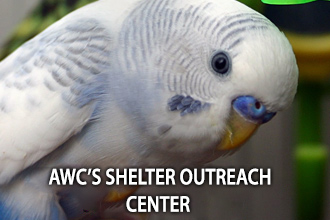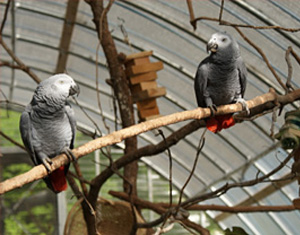True Animal Sanctuary – A refuge where there is:
- No commercial trade (buying or selling)
- No invasive or intrusive research
- No unescorted public visitation or contact with wild animals
- No removal of wild animals for exhibition, education, or research
- No breeding (Exceptions: rehabilitation and release centers engaged in a bona fide breeding-for-release program with available release sites within the state/province, conducted with specific conservation goals, in accordance with local, state/province, national, and international law and regulations
Pseudo Sanctuaries and Rescue Groups
Some groups claim to be rescue or sanctuary facilities, but in reality, they’re animal collectors or hobby breeders that simply formed a nonprofit organization to promote themselves as a refuge for birds. Many breed the birds they rescue to fund their operation or place them into breeding situations. Others acquire birds to use for entertainment in roadside zoos, or the peddle at bird marts, auctions or online. Learn more.
Animal Hoarders
Many unwanted birds also fall victim to “hoarders” who typically house more animals than they can adequately provide even the most basic standards of care for. Animal hoarding is a complex problem that often involves mental health, animal welfare and public safety concerns. Learn more.
Donate Responsibly!
Do your research to ensure that your support is going to a genuine avian shelter, sanctuary or placement organization.
Authentic Avian Rescue and Sanctuary Organizations-What They Do:
Avian rescue and shelter organizations in the U.S. and abroad range from small, home based rescue groups that provide temporary care and placement for birds in need to large sanctuaries that provide lifetime care for hundreds of birds.
Regardless of differences in their size, location, or available resources, true sanctuaries strive to meet the highest standards of animal care, ethics, organizational management, education, and advocacy.
Superior Avian Care – A safe, healthy and clean environment where birds have ample space, a nutritious diet, qualified medical care, and enrichment activities where they can express their natural behaviors. Socialization with other birds and the ability to exercise and free fly in a safe supervised area is essential. Each bird’s individual physical and behavioral needs are always put before the desires and expectations of their human caretakers
Professional and Sustainable Management - Taking in large numbers of birds-especially long-lived species like macaws and cockatoos-without sufficient resources can easily overwhelm an avian care facility’s ability to provide proper care, and conditions can quickly deteriorate.
Look for organizations with sound infrastructure, competent management, and a funding plan that will enable them to succeed long-term. They should comply with all federal, state, and legal requirements governing nonprofit organizations, have an active, independent board of directors without conflicts of interest, and offer transparency relating to their mission, animal care, and funding practices.
Advocacy and Collaboration - Bona fide rescue and sanctuary organizations stand against practices that contribute to the suffering and exploitation of animals. They also support social and legislative policies that will increase protections for birds in captivity and in the wild.
Education – Effective programs are focused on the facts, promote a better understanding of the true needs of birds, and offer solutions to the complex issues involved in addressing their welfare. Most importantly, the organization’s stance should be clear - all birds belong in their rightful place in the wild.
Public Outreach – Parrots are curious, intelligent, and fascinating creatures. Their highly emotional nature and behaviors are often entertaining to humans. As amusing as their antics may be, reputable groups refrain from exploiting them for profit or self-aggrandizement. Nor do they use birds to perform tricks or hire out birds for entertainment, commercial purposes, or purely for exhibition. These practices are typical of commercial entities that profit from animals and fly in the face of the ethical standards of legitimate sanctuaries dedicated to the refuge and protection of animals in their care.
Integrity - Reputable groups do not promote the commercial trade in birds, nor do they breed or place birds in breeding situations.
How AWC Works to Improve Standards of Care for Captive Birds!
A Milestone for Bird Protection - AWC provided comprehensive, species-specific standards for the care and treatment of birds under the Animal Welfare Act. But it took a 23- year legal effort by animal protection groups and a successful lawsuit brought by AWC and the American Anti-Vivisection Society to finally result in official legal protections for birds exploited in the pet trade, exhibition, breeding and some types of research under the federal Animal Welfare Act.
Avian Shelter Outreach – Our educational resources help animal sheltering facilities to care for captive exotic birds in a shelter environment. Visit our Shelter Resource Center.
Webinars - In partnership with the Global Federation of Animal Sanctuary, AWC’s webinar series provides support for animal care professional in need of additional training to care for birds in their facilities.
Avian Sanctuary Standards – Our Board members worked with national and international leaders in animal protection to co-found the Global Federation of Animal Sanctuaries to help strengthen and support the work of legitimate animal sanctuaries world wide.
We also participated in developing peer-reviewed standards of avian care for the Global Federation of Animal Sanctuaries manual, “Best Practice Standards of Care and Operations for Sanctuaries.”
More Resources:
Animal Hoarding – The Facts by Animal Legal Defense Fund
Animal Sheltering Resources - By the Humane Society of the United States (HSUS)
ASPCApro - By the American Society for the Prevention of Cruelty to Animals (ASPCA)




.png)